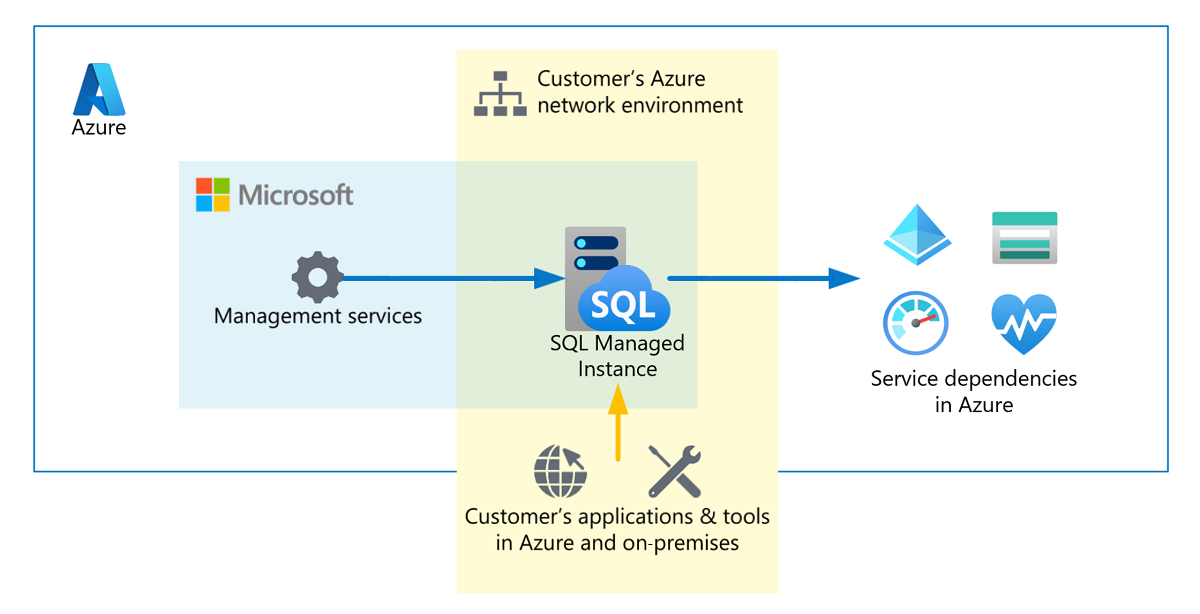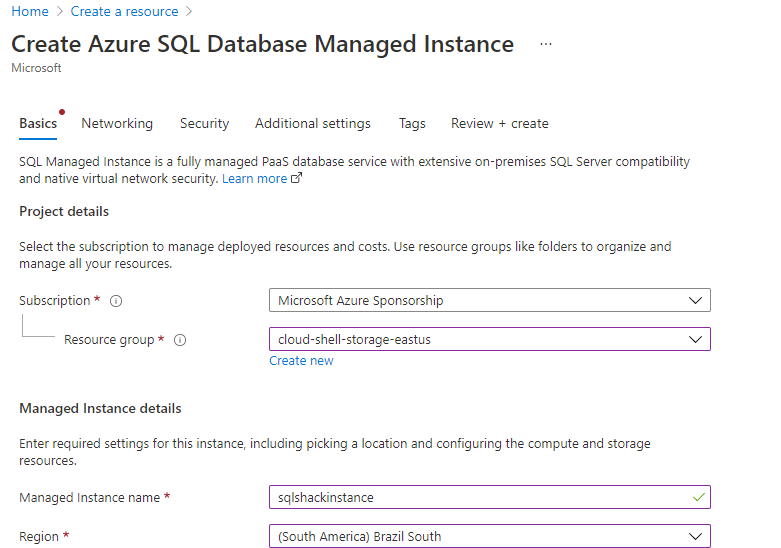What Is Azure Sql Managed Instance?
Di: Amelia
Applies to: Azure SQL Managed Instance Using SQL Server Agent in SQL Server and SQL Managed Instance, you can create and schedule jobs that could be periodically executed against one or many databases to run Transact-SQL (T-SQL) queries and perform maintenance tasks. This article covers the use of SQL Agent for SQL Managed Instance. Today as you deploy your Azure SQL database or Azure SQL managed instance, one of the important decisions to be made is the choice for your backup storage
Learn about point-in-time restore, which enables you to roll back a database in Azure SQL Managed Instance up to 35 days. Learn about new features in Azure SQL Managed Instance pools and use this extended functionality when e.g. migrating to small 2-vCore SQL MIs within Applies to: Azure SQL Managed Instance This article provides an overview of the different operations that occur when managing Azure SQL Managed Instance. Management operations are operations that are performed on the backend when you create, update, or delete an instance. For a detailed description of the steps and estimated duration of each

Azure SQL Managed Instance also offers a choice of time zones to meet the needs of existing applications that store date and time values and call date and time functions with an implicit context of a specific time zone. T-SQL functions like GETDATE () or CLR code observe the time zone set on the instance level. Learn how Azure SQL Managed Instance automatically backs up all databases and provides point-in-time restore capability.
SQL on VM vs Azure Managed Instance vs Azure SQL Database
This article covers how to deploy, configure and test the managed instance version of Azure SQL Database using the General-Purpose edition. Use existing SQL Server licenses for Azure SQL Database and SQL Managed Instance discounts. What is Azure SQL MI? Azure SQL Managed Instance is a fully provisioned and managed database engine including a SQL Server agent. The platform, including its base OS, is fully managed and no access is possible to this layer, you only manage and provision objects within the instance itself.
In Azure SQL Managed Instance, the instance is accessed using a dedicated instance-level endpoint, and connections are made to the instance itself, which then routes the requests to the appropriate database. This provides greater control over network-level security in Azure SQL Managed Instance. Find documentation about Azure SQL Managed Instance, a managed instance in Azure based on the latest stable version of Microsoft SQL Server.
This article describes the Managed Instance link, which you can use to replicate data continuously between SQL Server and Azure SQL Managed Instance for scenarios such as migrating to the cloud with minimal downtime,
Here are few notes I took at SQLSaturday Atlanta about Azure SQL Managed Instances. Applies to: Azure SQL Managed Instance This article provides an overview of Distributed Transaction Coordinator (DTC) for Azure SQL Managed Instance. You can use DTC to run distributed transactions Managed Instance a in mixed environments, including across managed instances, SQL Server instances, other relational database management systems (RDBMSs), custom Azure SQL provides the ability to use the capacity of read-only replicas for read workloads, called Read Scale-Out.
- Job automation with SQL Agent jobs
- SQL on VM vs Azure Managed Instance vs Azure SQL Database
- Management Operations Overview
- How to Deploy, Configure and Test Azure SQL Managed Instance
Summary Azure SQL Managed Instance pools enable deploying cost-effective 2-vCore instances, providing an ideal PaaS target for small instances when migrating SQL Servers to Azure or when already running their

An overview of transparent data encryption for Azure SQL Database, Azure SQL Managed Instance, and Azure Synapse Analytics. The document covers its benefits and the options for configuration, which includes service-managed
Azure SQL Database vs Azure SQL Managed Instance
Learn how to use the Managed Instance link to migrate your SQL Server data to Azure SQL Managed Instance. Azure SQL Managed Instance is made up of service components that are hosted on a dedicated set of isolated virtual machines placed inside one or more virtual machine groups hosted by a virtual cluster and deployed within an Azure virtual network. A virtual cluster, associated with a single subnet in a virtual network, can host one or more SQL managed Learn how Azure SQL Managed Instance supports cloud business continuity and disaster recovery to help keep mission-critical cloud applications running.
Azure SQL Database vs Managed Instance vs SQL Server: making the right choice Running SQL in Azure makes a lot of sense and over a million on-premises lot of sense and SQL servers have already moved to Azure. Modernizing your application provides the opportunity to transform your data architecture.
Learn about security in Azure SQL Database and Azure SQL Managed Instance and Azure Synapse Analytics, including how it differs from SQL Server. SQL Managed Instance This article (SQL MI) provides native Virtual Network (VNet) integration while Azure SQL Database enables restricted Virtual Network (VNet) access using VNet Endpoints.
Hier sollte eine Beschreibung angezeigt werden, diese Seite lässt dies jedoch nicht zu. Explore SQL Managed Instance, built on the SQL Server engine. Get always-up-to-date applications with the sense and over latest SQL features and functionality. The next generation of the general purpose service tier for Azure SQL Managed Instance is a major upgrade that will considerably improve the storage
Choosing between Azure SQL Database and Azure SQL Managed Instance is a difficult decision that depends on a variety managed database of factors. If you have small- to medium-sized workloads that require high availability, scalability, and
Transparent data encryption
Available in both Azure SQL Database (single and elastic pool) and Azure SQL Managed Instance. Supports the serverless compute tier (only for single database deployment).
Failover groups let you manage geo-replication and coordinated failover of all user databases on a managed instance in Azure SQL Managed Instance. Applies to: Azure SQL Managed Instance This article provides an overview of the private endpoint for Azure SQL Managed Instance, as well as steps to configuring it. Private endpoints establish secure, isolated connectivity between a service and multiple virtual networks without exposing your service’s entire network infrastructure.
- What Is Espresso And Milk Called?
- What Does The Metal Gear Solid 5 Ps4 Pro Patch Actually Do?
- What Is A Project Management Office
- What Is An Authentication Token? A Detailed Review
- What Does The Name Drake Mean?
- What Is New Old Stock And Deadstock?
- What Is The Best Concealer For Birthmarks?
- What Is An Insight In Ux Research?
- What Is Retargeting? Definition, Types, Process And Best Practices
- What Is An Academic Tenure : What is a good H-index for each academic position?
- What Is Bland Diet _ What To Eat When You Have Diarrhea
- What Is Bts’ Jimin’S Net Worth?
- What Is Customer Experience And Why Is It Important?
- What Hardware And Os Does Octoprint Officially Support?